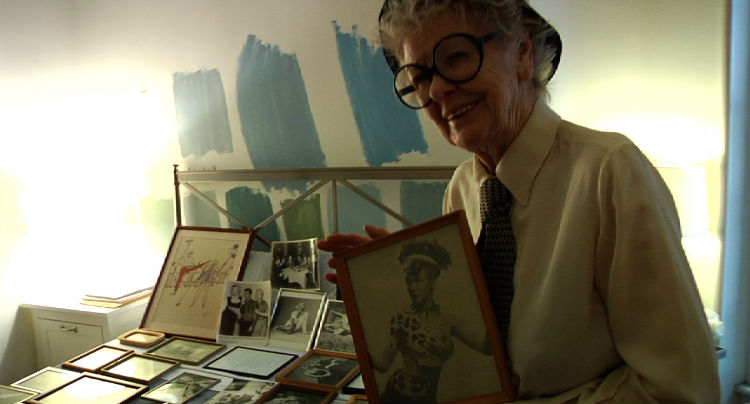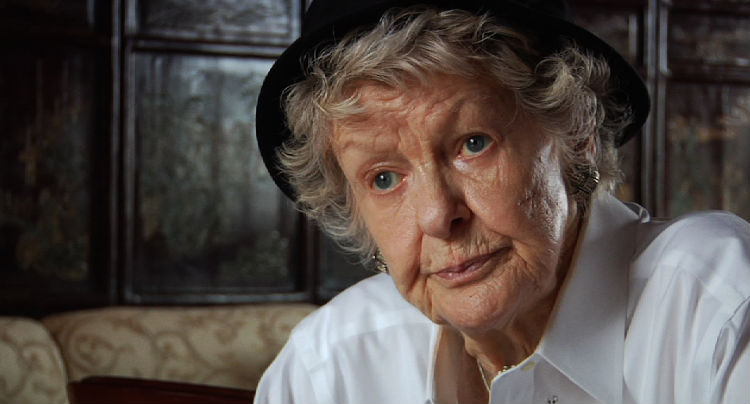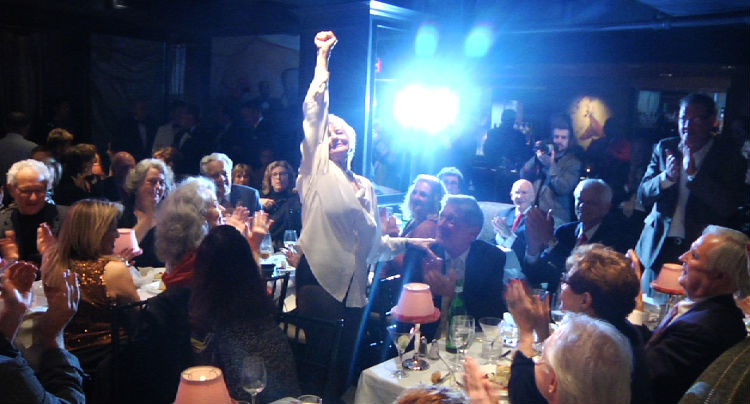
A delight in that we're able to spend time with as rare a creature as Elaine Stritch, but the film's human elements elevate it to greater heights.

A delight in that we're able to spend time with as rare a creature as Elaine Stritch, but the film's human elements elevate it to greater heights.
Elaine Stritch has one of the most enduring careers of any performer on earth. She’s an irreplaceable Broadway veteran, drawing thousands of eyes and ears with her skyscraper legs and unmistakeable, gaudy vocal delivery. Her television career started in the late ’40s, and chugged on for decades (she had a recurring role on 30 Rock as Alec Baldwin’s mother), and her movie career ain’t too shabby either. At 89-years-old, her immovable swagger hasn’t dwindled a bit: she still performs on stage when she wants to her rabid fan base, preys on poor souls her infamous scathing wit, and struts down the streets of New York like she’s 20 feet tall.
Chiemi Karasawa, a first-time director (though she’s worked on a bevy of other films as a script supervisor or producer), gazes at Stritch from an angle never before seen with Elaine Stritch: Shoot Me, a riveting portrait of an American icon vacillating between feeling immortal on stage and fearing for her life in a hospital bed. Karasawa goes beyond the hagiographic (though she clearly adores Stritch), contrasting fun moments of the grande dame at her most flamboyant with sober, more intimate footage in which she penetrates Stritch’s theatricality, revealing her vulnerable side. People have beef familiar with Stritch as a no-bullshit broad for years and years, so to see her express her insecurities and fears, and even show signs of humility and keen self-awareness, makes her an even more fascinating figure than she already was.

It’s clear Karasawa chose her footage carefully, as each scene highlights a different color of Stritch’s personality. (Her sparing use of archival footage, including clips of Stritch’s famous At Liberty show, helps to reinforce that the film is not a career retrospective.) When Stritch begins having trouble remembering the lyrics to a song during a rehearsal, you can see on her face that the doubt washing over her is an unfamiliar–and most importantly, frightening–sensation that she’s fighting to come to terms with. In a brilliant scene, Stritch gets short with the cameraman as she gives him direction as to how to shoot her fiddling with a package of english muffins. She tells him the shot she wants, and she starts the menial task all over again, as if it were a scene in a narrative feature. Save for this instance, none of the film is staged, Karasawa’s inclusion of the footage is invaluable. It’s a perfect illustration of how hard it is for Stritch to shed her Broadway nature, even while doing chores at home.
Clips of Stritch performing a one-woman Sondheim show in a club act as the film’s structural glue: these evenly dispersed bits remind us of her extraordinary talent and ability to draw in an audience, even at her advanced age. Karasawa also includes talking head interviews with former co-stars of Stritch, including the late James Gandolfini, Baldwin, Tina Fey, and Nathan Lane. With a fond smile and a giggle they recall their experiences with Stritch, being at once taken aback and compelled by her larger-than-life attitude. She clearly has fans behind the curtain and camera as well.

The film is at its most somber when we see Stritch struggling with health complications and a lingering alcohol issue. Maintaining her blood sugar levels is a constant concern, she wrestles with whether or not she should ditch her daily habit of drinking a mini bottle of hard liquor, and her memory is fading. She’s coming to terms with the fact that her performer lifestyle is likely coming to an end, and this internal push and pull between her invincible spirit and deteriorating body is Karasawa’s focus. Elaine Stritch: Shoot Me is a delight in that we’re able to spend time with as rare a creature as Elaine Stritch, but the film’s human elements elevate it to greater heights.